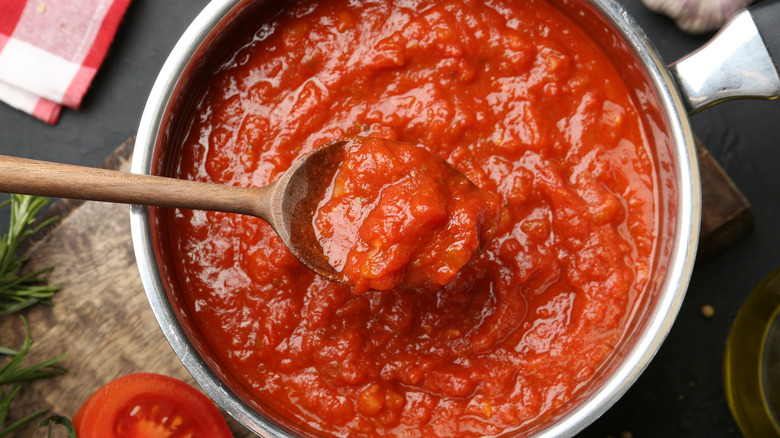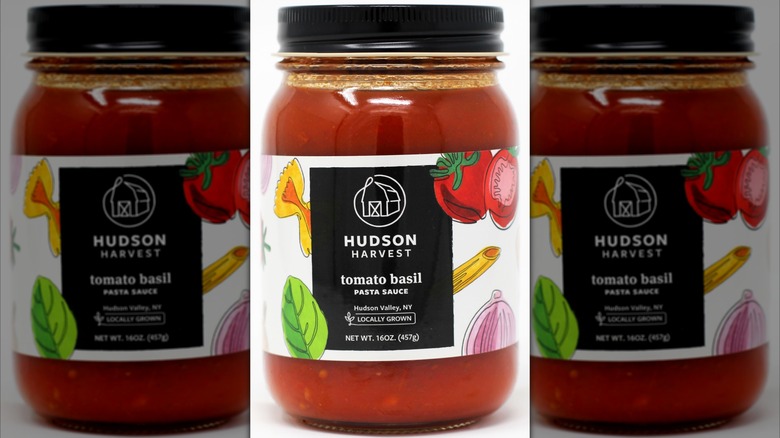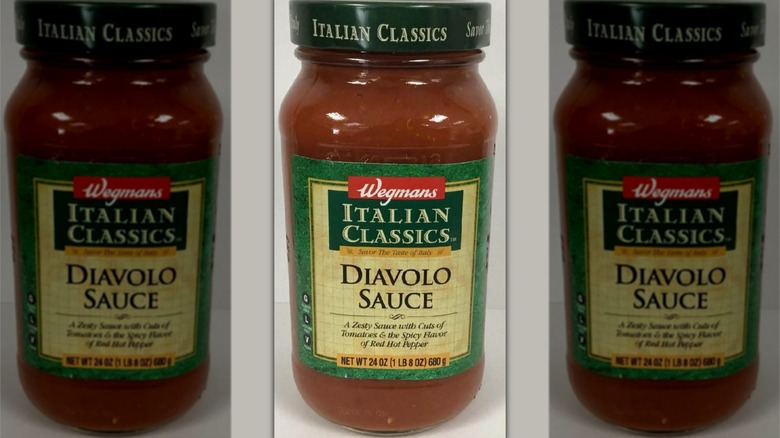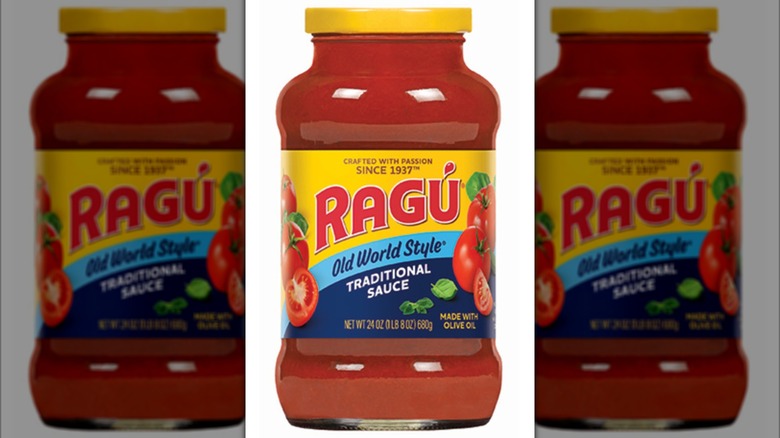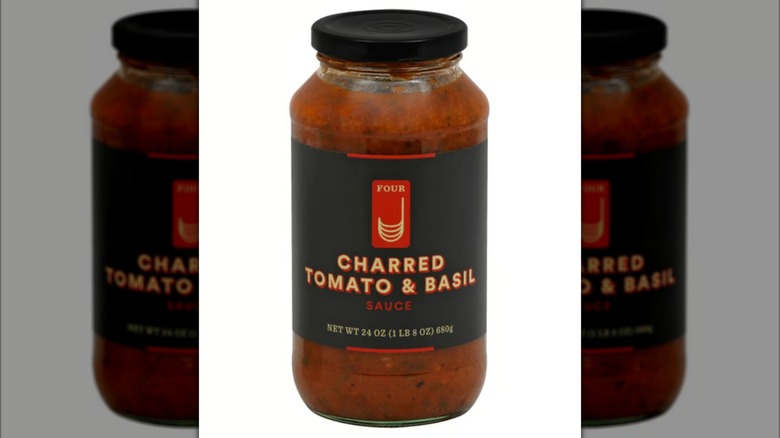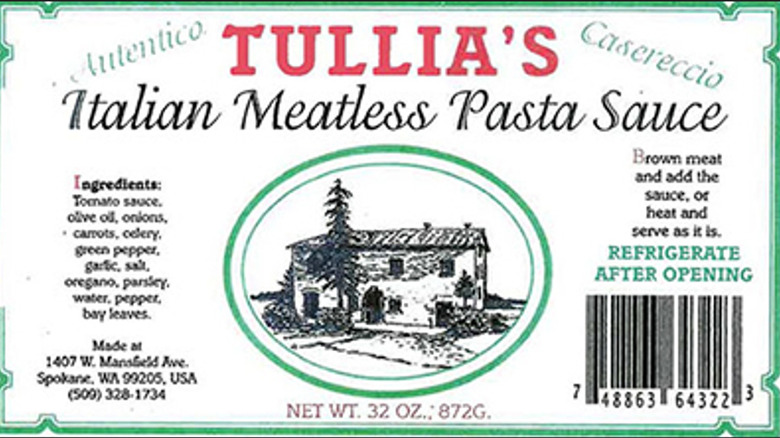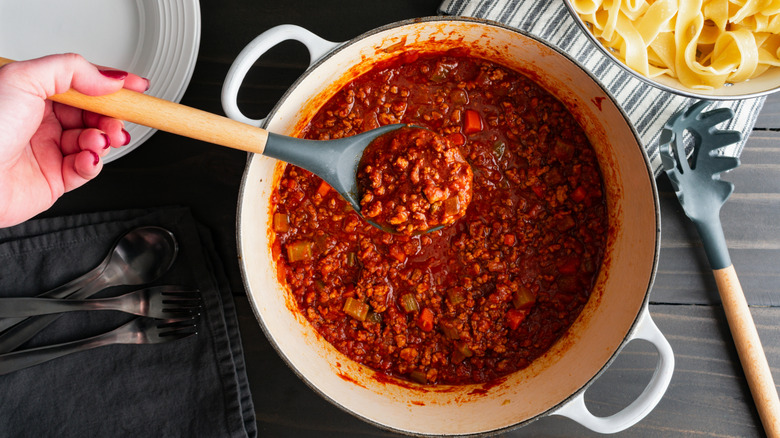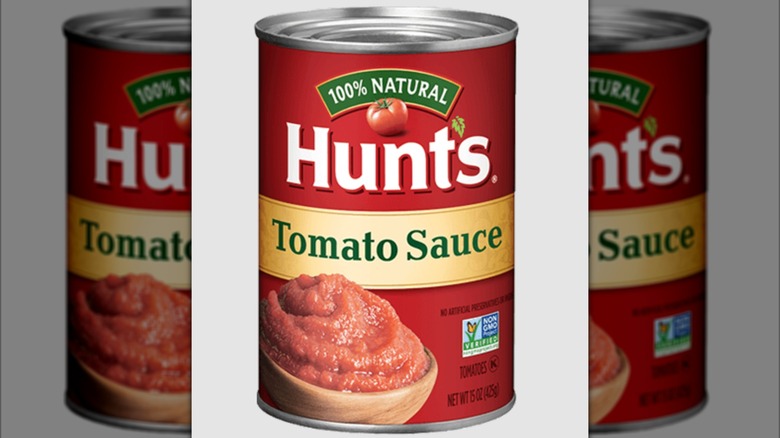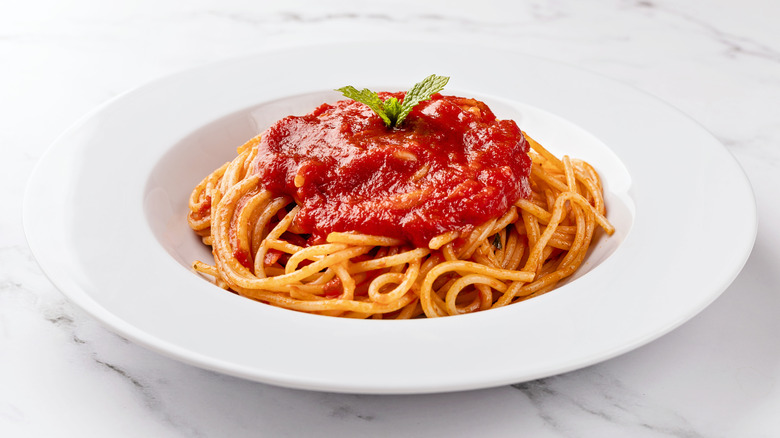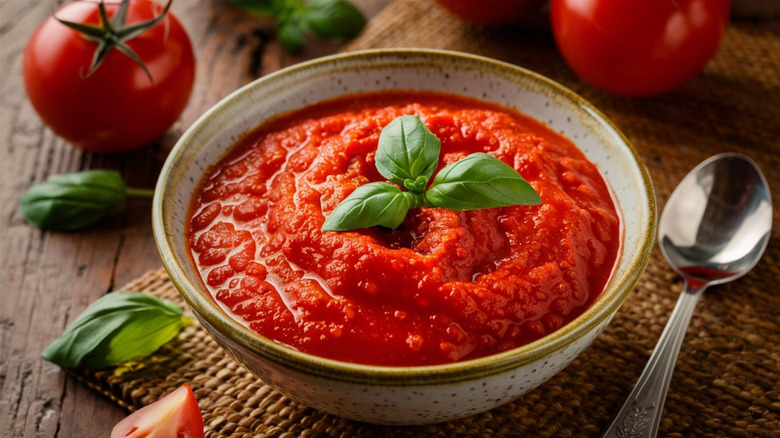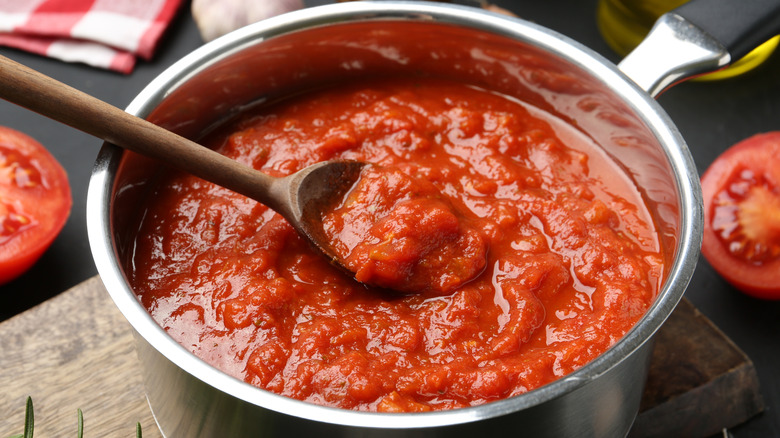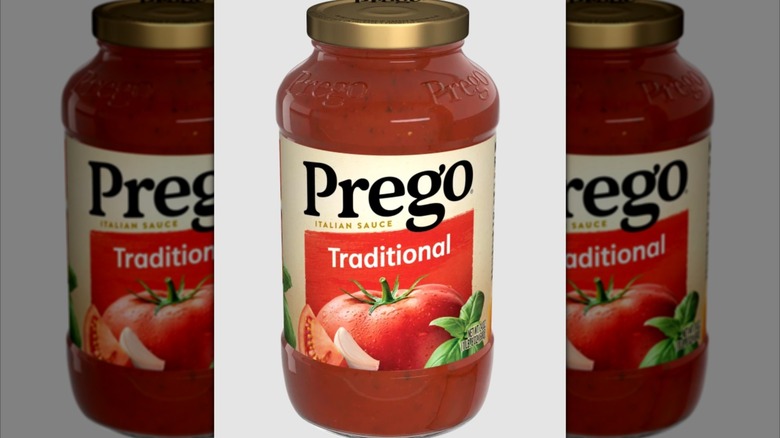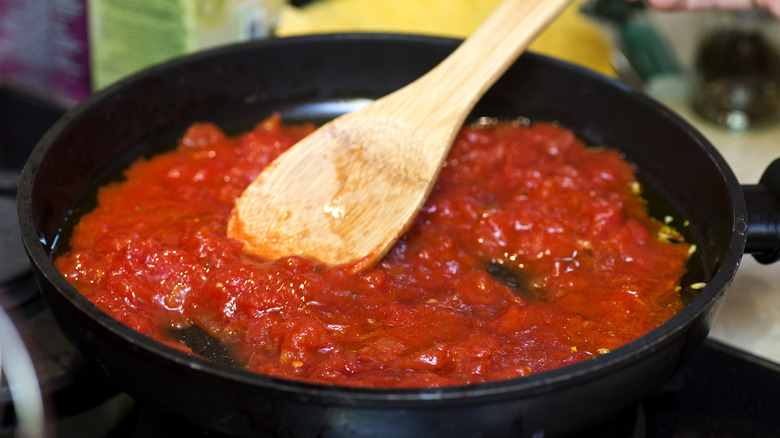14 Worst Tomato Sauce Recalls That Hit America
There are few food products more reliable than tomato sauce. Jarred and canned tomato sauce are easily upgradeable ingredients that you can put in hundreds of different dishes, and which are usually pretty easy on the wallet. So what's the problem? Well, these sauces are unfortunately prone to being recalled. Store-bought tomato sauce goes through a surprising amount of processing before it reaches supermarket shelves, and at every point in its journey, it can become compromised. Even the best jarred marinara sauces out there might not be safe from the punishment of a recall notice.
Tomato sauce is especially vulnerable to bacteria that cause botulism, a serious illness that rears its head as a result of eating homemade canned foods that have been improperly prepared, although it can contaminate store-bought foods too. Another problem can be a lack of proper cooking and treatment before the sauce is jarred, which can lead to spoilage and bulging. However, the vast majority of tomato sauce recalls are caused by innocent mistakes that can lead to big problems, with mislabeling being a common issue that leaves folks at risk of having allergic responses triggered. All of these reasons for recalling tomato sauce are simple enough, but can result in some really nasty issues for customers.
1. An under-processed tomato sauce led to bulging jars and a multi-state recall
It's common practice to cook jarred or canned tomato sauce, but the truth is that you really don't need to. In theory, this product should be good to go straight out of its container. At least, that's true most of the time. It wasn't quite the case in 2024, when one batch of jars of Hudson Harvest Tomato Basil Sauce had to be recalled. The jars had to be tracked down following reports that they had been leaking, swelling, and even bursting, which led the producers to believe that the tomato sauce inside them hadn't been processed thoroughly enough.
In short, it seems as though Hudson Harvest's tomato sauce hadn't been heated sufficiently before it was sealed into its containers. Heating jarred and canned food to an appropriate temperature kills any microorganisms that are living in it, while also removing any air and forming a vacuum. The combination of these two things ensures that the product inside the container doesn't spoil or grow pathogens, which then produce gas inside the food, leading to bulging or leaking containers. Luckily, it didn't seem as though any customers became ill from eating the tomato sauce, but as Hudson Harvest had distributed its items to a few different states, it had a difficult task on its hands to get them back.
2. A 2023 recall was announced after undeclared anchovies
Anchovies give a huge amount of flavor to spaghetti sauce, and one of the best things about using them is that you often don't even realize they're in there. When anchovies are cooked, they disintegrate into the sauce, leaving behind an intense umami flavor that doesn't necessarily taste like fish. However, the fact that anchovies are imperceptible isn't such good news if you're allergic to them and don't know that they're in something that you're buying. In 2023 that became a very real possibility if you were buying a pasta sauce produced by LiDestri Food Co., which failed to include anchovies on its ingredients list despite containing the briny fish.
LiDestri Food Co. was alerted to the issue when a customer who bought the sauce complained that there were anchovies inside, despite the label not declaring their presence. It seems that the problem was caused by a temporary failure while the product was being jarred, which led to it being mislabeled. While anchovy allergies are less common than other types of seafood allergies, they can be just as severe and produce all of the same nasty symptoms that other severe allergies can prompt, including hives, swelling, nausea, and anaphylaxis.
3. Possible fragments of plastic caused a tomato sauce recall
You may not mind your food coming in plastic, but you definitely don't want any plastic inside the things that you're eating. Sadly, plastic ending up in food is way more common than you might think, and it's the culprit of countless recalls around the country. One such recall occurred in 2019, when Mizkan America had to recall several of its RAGU sauces, due to the risk of plastic pieces inside certain jars. Three different types of chunky sauce and two different Old World Style sauces had to be tracked down as a result of the possible issue, with retailers reaching out to customers to alert them to the problem.
The good news was that this issue hadn't been flagged by any customers who had encountered plastic pieces, or indeed any that had eaten them. However, it was good that the company acted when it did. Plastic pieces represent a significant choking hazard in any food, but they're especially risky in foods like tomato sauce, which can be gulped down without much chewing (even chunky ones, folks). As well as choking, plastic fragments can also cause tooth, gum, and mouth injuries.
4. In 2018, a recall was prompted by multiple undeclared allergens
Tens of millions of American adults have food allergies, and emergency room visits resulting from food-related allergic reactions are distressingly common. It's therefore vital that food producers declare any allergens in their products prominently and consistently, particularly if there's more than one ingredient that could trigger a reaction. Sadly, manufacturers can still fall victim to errors and mislabeling. This was the case in 2018, when thousands of jars of tomato sauce had to be recalled because three (yes, three) allergens were missing from the label.
Cookwell & Company, the company behind the product, discovered that its Charred Tomato & Basil Sauce was missing soy, wheat, and fish allergen information from its label. This came as a result of unintentional mislabeling, and the company didn't receive any indication that customers had become ill because of eating the sauce. However, given the common nature of soy, wheat, and fish allergies, the company had to track down the affected products, with over 6,500 jars being recalled.
5. A tomato pasta sauce was recalled because of botulism fears
One of the scariest tomato sauce recalls took place in 2014, and involved a humble-looking jar of pasta sauce made by Tullia's. This Spokane-based company discovered that its Italian Meatless Pasta Sauce, which had been shipped to multiple locations in the Spokane area, might have been contaminated with bacteria that can cause botulism.
The company rushed to get its tomato sauce back before there were any customer incidents or illnesses, and it's a good thing they did so. Botulism is one of the most dangerous illnesses that can be caused by improperly jarred food. The bacteria Clostridium botulinum, which takes up residence in the food, releases a toxin that wages war on the nervous system. This can lead to paralysis and, in some situations, even death. The issue with the bacteria that causes botulism is that it thrives in low-oxygen atmospheres, like cans or jars of tomato sauce. Add in the fact that you can't taste, see, or smell botulinum toxin, and things can go wrong very quickly. Just because a recall is local, doesn't mean it's any less serious.
6. A large amount of bolognese sauce was mislabeled, causing a recall
We trust food labels, don't we? We just believe that the ingredients that are listed on our food labels are actually what's in the food itself. Unfortunately, there have been some incidents that have made us trust food labels just a little bit less, like a 2013 recall that saw a company having to find tens of thousands of jars of tomato sauce. Summer Garden Food Manufacturing had to recall over 25,000 pounds of its Giant Eagle-branded bolognese sauce because it was missing multiple allergens from its label. When the company conducted a label review of its product, it discovered that sub-ingredients in its sauce contained both soy and wheat, both of which can cause an allergic reaction.
As well as these allergens, the sauce was found to contain MSG, which also wasn't declared on the label. MSG (or monosodium glutamate) is commonly thought to produce allergic responses, but this is now widely considered to be a false belief. There's no convincing evidence that MSG can cause allergic responses — but it may be possible to have an MSG sensitivity. Plus, you really should know what's in your food, right?
7. A packaging defect caused a recall of canned tomato sauce
Anyone who's ever watched a disaster movie will know the value of canned foods. They can last for years at room temperature, sealed inside metal that can allow them to survive even the bumpiest car journeys (or a long spell in a bomb shelter). However, that's only the case if the cans themselves are manufactured properly, and in 2013 one of the biggest food producers in the world, ConAgra Foods, was placed in the embarrassing position of having to recall tomato sauce that wasn't.
The issue was that two popular ConAgra Foods' products, its Hunt's Tomato Sauce and Hunt's Tomato Sauce No Salt Added, had been produced using defective cans. The cans had defective inner linings which may have caused the cans to swell or even burst when they were opened by customers. Food cans are generally made with an epoxy lining that prevents corrosion, but it seems as though the lining in this case wasn't well-made enough to prevent chemical reactions from occurring in the can itself. It didn't help that the company had already distributed its products to 12 different states, and that the defective cans had been produced sporadically over several months.
8. When a label for tomato sauce didn't include cheese, a recall was issued
Cheese and tomato sauce: It's a match made in heaven. Well, for some people, at least. It's less of a timeless combo if you're lactose intolerant or have a dairy allergy, both of which can cause disagreeable symptoms, with an allergy potentially being extremely dangerous. So it's little surprise that when the Hirzel Canning Company failed to include cheese on the label for its Meatless Spaghetti Sauce in 2005, it was a pretty big issue.
The omission was a result of mislabeling, but it seems as though the company didn't catch the problem immediately, with the sauce being produced and shipped over several days before anyone caught wind of it. However, by that point the sauce had been shipped to four different states, making Hirzel Canning Company's job quite extensive (and pretty annoying). The good news was that the company solved the issue swiftly, and the recall hadn't been a result of any customers becoming ill. It was a pretty close call, though.
9. A 2019 recall was announced because of undeclared cashews
It's no secret that nut allergies are one of the most risky food-related conditions out there, and the need for food companies to accurately declare the ingredients in their products to prevent allergic reactions is crucial. Unfortunately, in 2019, one company failed to do just that. B&G Foods had to recall well over 1,000 cases of its marinara sauce, after it was found that it potentially contained cashews that had been undeclared. It's unclear exactly how the cashews made it into the tomato-based sauce, but it seems clear that they weren't meant to be there.
Even more worryingly, B&G Foods found out that cashews were in the sauce after a customer let them know that they had experienced a potential allergic reaction. It's very lucky for the company that things hadn't been far worse, and it was wise to respond so quickly. The good news was that while there were a fair few jars to track down, they were only produced on one single day at one facility.
10. Wegmans had to recall its tomato sauce because it contained milk
You generally expect tomato sauce to contain tomatoes, right? Well, you might be surprised at how many other ingredients certain brands can contain — and how often these ingredients can be unwelcome. This was a problem way back in 2008, when Wegmans had to conduct a recall of its Italian Classics Seasoned Tomato Sauce. The reason? Milk had ended up in the tomato sauce, and that milk hadn't been declared on the label.
The issue was discovered when a Wegmans employee flagged the issue, and thankfully, no customers experienced an allergic reaction as a result of consuming the sauce. It's not entirely clear whether the milk was meant to be in the tomato sauce or not, and whether this was a result of cross-contamination or mislabeling. It wouldn't be super surprising if it was the latter. After all, milk powder is commonly added to processed sauces as a way to enhance flavor and emulsify ingredients, as well as to boost the nutritional value of food. If it was intentional, though, you'd hope that they would declare it on the label.
11. Campbell's tomato sauce was recalled due to potentially being spoiled
Food recalls affect even the biggest brands out there, and even a big name like Campbell's hasn't escaped this fate. In 2013, the company was forced to recall a small but significant quantity of its Prego Traditional Italian Sauce. 300 cases of the sauce were recalled after Campbell's discovered that certain jars might contain spoiled product, after a routine quality check indicated that the sauce was substandard and potentially inedible.
The prospect of opening a car of spoiled tomato sauce is naturally pretty unpleasant, but amazingly, the spoilage itself probably wouldn't make you sick. However, the bigger issue is that any jarred food that's able to become spoiled may be subject to other manufacturing or safety issues, and these could result in much more dangerous, pathogenic bacteria taking hold of the sauce and causing illness. It was therefore essential that Campbell's acted when it did, and its task was made more stressful by the fact that the sauce had been shipped to seven states. We'd say that trying to find the odd case here and there is arguably more troublesome than just recalling your whole range of stock.
12. A spaghetti sauce recall occurred because of an undeclared milk allergen
It's pretty amazing how often milk allergens fail to get declared when it comes to tomato sauce. In 2008, this particular issue struck yet again, when a Virginia-based company ended up missing milk off the ingredients list for its tomato sauce entirely. CF Sauer Foods Inc. had to put out a hasty recall for its Gold Medal spaghetti sauce when someone discovered that a milk ingredient in the product wasn't declared anywhere. The fear, of course, was that this could cause an allergic reaction, prompting the company to scramble to get its pouches of sauce back.
Thankfully for CF Sauer Foods Inc., the company only had to try and find a limited number of items. Only 234 cases of its spaghetti sauce pouches had been shipped with the error, although this had been done over a substantial time period, increasing the risk of them spreading further and wider. People who bought the sauce pouches were entitled to a refund — which we think is the least that the company could do, considering that they could have seriously endangered some people.
13. In 2012, tomato sauce ended up in the wrong jar — prompting a recall
When you buy a jar of something, you expect the food inside to match the label, right? Unfortunately, this isn't always the case, and in 2012 a mix-up with tomato sauces prompted a recall of more than half a ton of product. Cucina Fresca Foods had to claw back jars labeled as containing Smoked Tomato Sauce, because it turned out that what was inside the jar was a different tomato sauce entirely: a Tomato Vodka Sauce.
Vodka brings out distinctive flavors in tomato sauce, but this recall wasn't just an issue because the jars contained the wrong product. It was also an issue because that product contained an allergen that wasn't declared on the label. The vodka sauce that ended up in each jar contained milk which, if consumed, could have caused a serious allergic reaction. The saving grace of this recall was that it seems nobody suffered any adverse effects from the sauce, and it looks like the main issue was that people were getting a product that they didn't actually want. After the recall, the company responded by improving its labeling procedures to ensure that a problem like this wouldn't occur again.
14. A mislabeled sauce was recalled after it was sent to multiple states
Mislabeled products have been recalled for decades, which kinda makes you wonder how it's still happening, considering how dangerous missing ingredients off a label can be. Way back in 2006, there was yet another incident involving tomato sauce, and it hit a pretty major food company. Unilever had to recall roughly 1,000 jars of its Old World Style Ragu tomato sauce, after it was discovered that the milk in the recipe wasn't declared on the label.
Although milk may sound strange in a tomato sauce, it's an essential ingredient in some recipes. Milk is commonly used in classic bolognese sauce to give it a smooth, luscious texture and a creamier flavor. However, it's a less attractive ingredient to people with dairy allergies, and if you're planning on giving your kids an easy pasta dinner, things could be even more risky. Almost 2% of all children in the United States have a milk allergy, according to research published in the journal Pediatrics, and without properly labeled allergen info things can go wrong very quickly.
